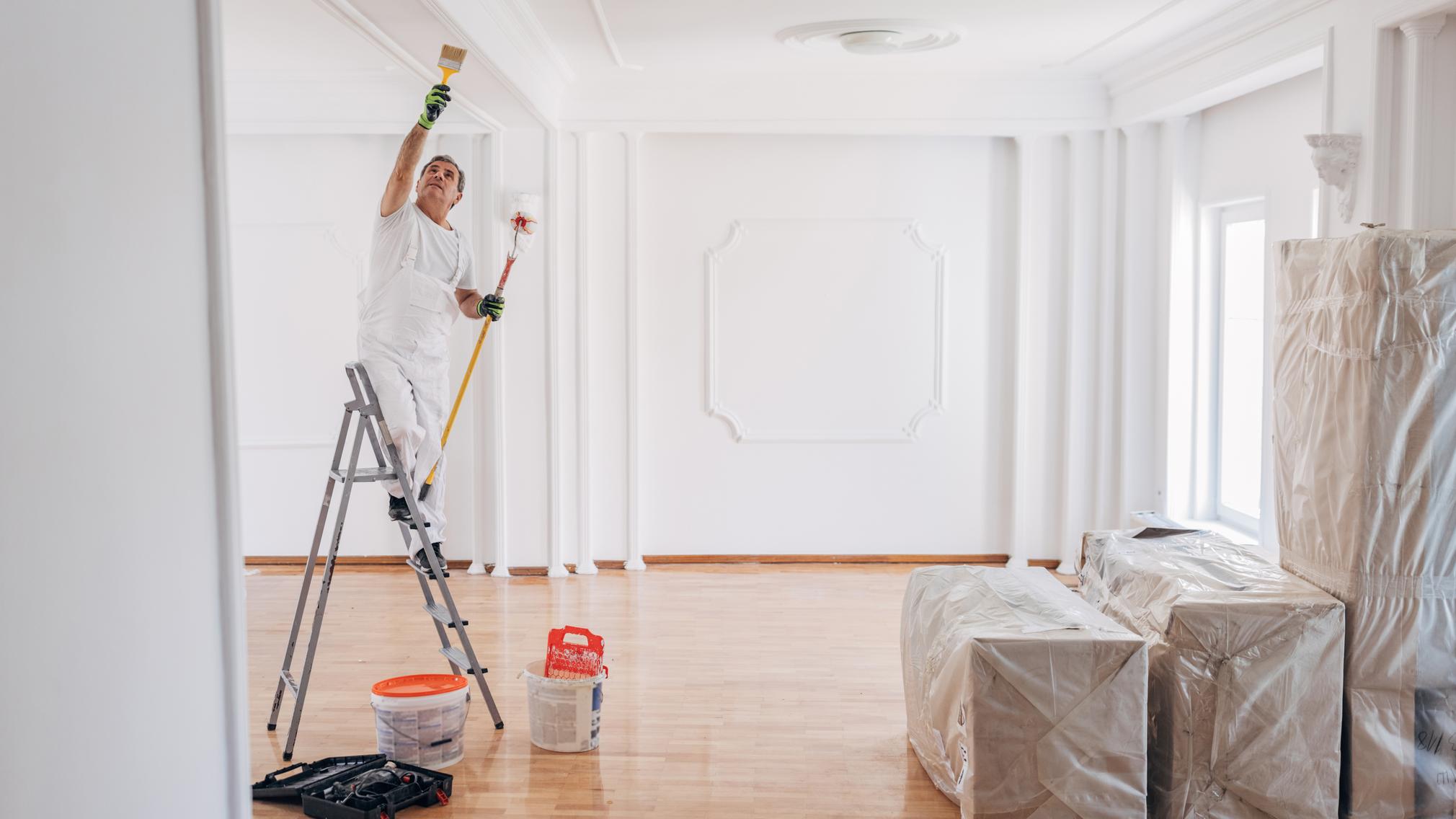What Are Landlords Responsible for Fixing?


Written by Shawnna Stiver on July 10, 2025
Landlords are responsible for fixing issues that affect a rental home’s safety, livability, or compliance with housing standards. This includes rental property repairs like electricity, plumbing, or structural issues. Laws vary by state, but landlords are generally required to keep the rental in habitable condition and perform repairs in a timely manner.
As a tenant, you’re responsible for reporting issues to your landlord as soon as possible. Here’s a breakdown of the most common repairs that fall under a landlord’s responsibility — so you know which repairs your landlord is responsible for, and which ones are on you.
Maintain heating and cooling systems
In most states, landlords are required to ensure reliable heat during colder months. If the system stops working, they must fix or replace it quickly, depending on the urgency. Some cities, like Phoenix, have local ordinances that set maximum indoor temperatures thresholds, effectively requiring functional air conditioning systems during hotter months.
Examples of heating and cooling issues a tenant should report to their landlord:
- Broken furnaces, radiators, baseboard heaters
- Air conditioning units and central air systems (in states where cooling is considered essential)
- Thermostats and ventilation fans
Fix plumbing issues and provide running water
Landlords must ensure the home has working plumbing and consistent access to hot and cold water. Major issues like a broken water heater or burst pipe should be addressed immediately. Always report plumbing problems in writing and keep records. Plumbing issues can become serious fast, so it’s important to understand your rights as a renter and move quickly in the event of an emergency. As the tenant, you’re responsible for using appliances and plumbing fixtures appropriately to mitigate potential issues.
Examples of plumbing and water-related issues a tenant should report to their landlord:
- Leaky faucets and burst pipes
- Clogged drains or toilets
- Loss of hot water
- Sewer or septic backups
Removing black mold and health hazards
If a health hazard like mold is reported, landlords are typically required to investigate and, if necessary, remove it — often through licensed remediation services, depending on local laws. Some states have specific timelines and disclosure laws, especially for mold and lead paint. Having renters insurance can help cover the cost of repair or replacement of belongings damaged due to mold or leaks. You’re responsible for keeping the unit sanitary, including kitchen, bathroom, and floors, to mitigate potential health hazards while occupying the rental.
Examples of health hazards a tenant should report to their landlord:
- Cracked ceiling
- Broken windows
- Moisture on the walls
- Insect droppings
Address pest infestations
In multi-unit buildings, landlords are typically responsible for pest control. In single-family homes, the responsibility can vary and will depend on the lease and cause. If the infestation isn’t due to tenant behavior, landlords are generally responsible for hiring pest control and addressing any conditions that contributed to the problem.
Examples of pest infestations a tenant should report to their landlord:
- Cockroaches, rats, or mice in the unit
- Bedbugs or ants in multiple units
- Infestation caused by building conditions
Keep smoke and carbon monoxide detectors working
Most states require landlords to install properly functioning smoke and carbon monoxide detectors. Tenants can be responsible for replacing batteries (if noted in the lease), but landlords typically ensure the devices are functional and up to code.
Examples of smoke and carbon monoxide issues a tenant should report to their landlord:
- Missing or broken smoke detectors
- Dead batteries or false alarms, if landlord is responsible for replacement
- Expired or malfunctioning carbon monoxide detectors
Fix electrical problems and faulty wiring
Landlords must ensure all electrical systems are safe and code-compliant. If outlets or lights stop working — or if you notice sparks, buzzing, or heat — alert your landlord immediately. Never attempt DIY repairs with electricity.
Examples of electrical issues a tenant should report to their landlord:
- Flickering lights or dead outlets
- Circuit breakers that trip frequently
- Exposed or frayed wiring
Maintain the building’s structure
If any part of the home becomes structurally unsound and affects its safety or livability, notify your landlord immediately. These issues may pose serious safety risks and often require urgent attention. Landlords are typically required to meet all applicable building codes to maintain a habitable unit.
Examples of building structure issues a tenant should report to their landlord:
- Cracked or shifting walls and foundations
- Sagging ceilings or unsafe flooring
- Loose railings or broken stair treads
Prevent leaks and protect against weather
Water intrusion can lead to mold and structural damage. In most cases, landlords are responsible for repairing leaks, sealing roofs and windows, and taking reasonable steps to ensure the home is protected against rain, wind, and snow. If your personal belongings are damaged by weather-related issues, renters insurance may help provide financial protection, depending on your specific policy.
Examples of weather prompted issues a tenant should report to their landlord:
- Leaky roofs, windows, or doors
- Drafty or broken windows
- Water damage from storms or snow
Provide working locks and home security
Landlords are often responsible for ensuring all exterior doors and windows have working locks. If a lock breaks or a key doesn’t work, it is usually their duty to repair or rekey it. In some cases, this also applies when tenants move out — the locks are changed as a security measure or based on local requirements.
Examples of lock concerns a tenant should report to their landlord:
- Broken door or window locks
- Keys that don’t work
- Exterior doors that won’t latch
Maintain shared common areas
In multi-unit buildings, landlords are commonly responsible for the upkeep of shared common areas, such as lobbies, stairwells, hallways, and laundry rooms. They are expected to keep these areas reasonably clean, well-lit, and free from hazards.
Examples of common area issues a tenant should report to their landlord:
- Burned-out hallway lighting
- Broken mailboxes or entry systems
- Damaged stairs, handrails, or flooring
How to report repair problems to your landlord or property manager
If something in your rental needs fixing, it’s important to report the issue to your landlord or property manager as soon as possible. Clear communication ensures repairs are handled quickly and prevents small problems from turning into bigger ones. Here’s how to properly report repair issues and get them resolved efficiently.:
- Document the issue. Take clear photos or videos of the damage or problem. Keep copies of dated emails or texts if you've already notified your landlord.
- Submit a formal repair request in writing. Even if you’ve already mentioned it verbally, send an official request via email or your tenant portal. Include a description, photos, and a reasonable timeline for completion (e.g., 3–5 days for non-emergencies).
- Check your lease and local laws. Your lease may outline specific timelines or procedures for maintenance. Local housing laws may also mandate how quickly a landlord must respond — especially for health and safety issues.
- Send a follow-up letter. If there’s no response, send a second message clearly labeled as a follow-up.
- Contact a local tenants’ rights organization. Many cities have nonprofit advocacy groups that offer free help, templates, or legal resources if you are experiencing a serious repair issue.
- Escalate to code enforcement or housing authorities. If repairs still aren’t made, you may consider contacting your local housing authority or code enforcement office. They can help assess whether the issue violates local housing standards and may send an inspector if appropriate.
- Consider legal advice. If the situation remains unresolved, you may want to explore your legal options. In some states this could include rent withholding or other remedies, but only if done in strict accordance with local laws. If you suspect discrimination may be involved, consider speaking with a legal expert or fair housing organization to better understand your rights under the Fair Housing Act.
Follow this process to protect your rights as a renter and help you navigate repair issues more effectively. If you’re unsure who should fix something, review your lease or ask your landlord or property manager for clarification. In most states, landlords have a legal duty to provide safe, livable housing to their tenants. If delayed repairs are causing unexpected damage to your personal belongings, renters insurance may help reimburse you, and even provide emergency lodging costs. Stay organized, stay persistent, and be confident in speaking up if your rental unit has issues that are your landlord’s responsibility to address.
Find an apartment you’ll love on Zillow
With Zillions of up-to-date listings and filters for your must-haves, it's easy to find your perfect apartment on Zillow Rentals.
Search rentals


